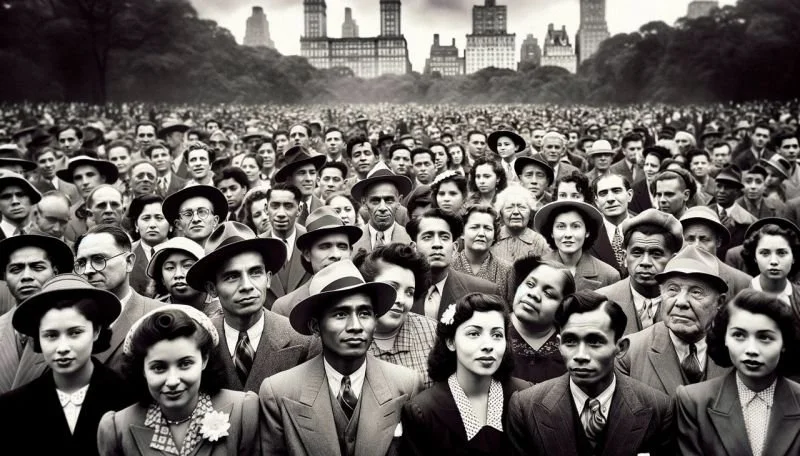A LEARNED JUDGE AND HIS "POETRY OF LIBERTY"
MANHATTAN, MAY 21, 1944 — Shortly after noon on a cloudless spring day, with the nation at war and tolerance teetering, Central Park begins to fill with Americans, new and native born.
Another “I Am an American Day” is set to swear in another crop of newly naturalized citizens. The usual flags and speeches hold forth. But just before the swearing in, a craggy old judge rises to give another speech. His words echo across the waves of people. They will soon echo across America.
“We have gathered here to affirm a faith,” the judge begins. “A faith in a common purpose, a common conviction, a common devotion.” Our faith, he explains, is in “the spirit of liberty.” We need this faith today, but first, that name!
Victorian novelists often named characters for their traits. Mr. Frigidy. Mr. Bumble. Mr. Scrooge. But although born in the Victorian era, Billings Learned Hand got his middle name from his mother’s maiden name. Still, when he dropped “Billings” and was appointed to the bench, he assumed a moniker you couldn’t make up — Judge Learned Hand.
Though barely remembered today, Learned Hand was once, the Washington Post wrote, “unquestionably the first among American judges.” Often considered for the Supreme Court, whose justices cited him more than any other judge, Hand spent most of his career on the U.S. Second District Court of Appeals. There he handed down some 4,000 opinions, most on such fascinating topics as patents and anti-trust law. But in the thick of war, one speech made him a “poet of liberty.”
Raised in a prominent legal family, Hand had an “almost hereditary” attachment to law. But he was, he admitted, “never any good as a lawyer. I didn't have any success, any at all.”
Then in 1909, he was appointed to the bench. During fifteen years as a trial judge in Manhattan, Hand mastered both the law and its conflicting definitions of liberty. He befriended Theodore Roosevelt, Walter Lippmann, and other progressives, and defended tolerance in a nation of Jim Crow and Red scares.
On Obscenity. A tolerant society should not “reduce our treatment of sex to the standard of a child's library in the supposed interest of a salacious few.” Instead, “community standards” should prevail.
On sedition. Subversive speech should depend upon an “incitment test,” only prosecuted if proven to foment rebellion.
On Harvard’s quota for Jewish students: “If we are to have in this country racial divisions like those in Europe, let us close up shop now.”
Appointed to the Federal Court of Appeals, Hand upheld FDR’s New Deal, which he called “an act of creative imagination.” And when America went to war, this product of the Victorian and Progressive Eras deftly defined the line between freedom and license.
A spring day. A million-plus in Central Park. A single speech, barely over 500 words.
“What do we mean when we say that first of all we seek liberty? I often wonder whether we do not rest our hopes too much upon constitutions, upon laws, and upon courts. These are false hopes; believe me, these are false hopes. Liberty lies in the hearts of men and women; when it dies there, no constitution, no law, no court can save it.”
What, then, is this spirit? “I cannot define it; I can only tell you my own faith. The spirit of liberty is the spirit which is not too sure that it is right; the spirit of liberty is the spirit which seeks to understand the minds of other men and women; the spirit of liberty is the spirit which weighs their interests alongside its own without bias. . .”
Freedom, the judge continued, is not absolute. “It is not the ruthless, the unbridled will; it is not freedom to do as one likes. That is the denial of liberty, and leads straight to its overthrow. A society in which men recognize no check upon their freedom soon becomes a society where freedom is the possession of only a savage few, as we have learned to our sorrow.”
Five hundred words. Then the judge asked 150,000 immigrants to raise their right hands and repeat. “I pledge allegiance. . .”
The daily press ignored the judge’s speech, but days after the D-day invasion, The New Yorker printed excerpts. Other press followed, making Judge Learned Hand “a folk hero.” In 1947, on his 75th birthday, he was hailed as “a judges' judge. . . not because of his standing in the judicial hierarchy, but because of the clarity of thought and the cogency of reasoning."
In 1952, The Spirit of Liberty became a widely-read book. Hand retired but continued to speak on liberty’s behalf. On McCarthyism: “I believe that the community is already in process of dissolution where each man begins to eye his neighbor as a possible enemy. . .”
When Learned Hand died in 1961, the London Times wrote, “the golden age of the American judiciary has come to an end.” But his “poetry of liberty” echoes on.
The learned judge once compared society to a schoolyard. Imagine children playing, quarreling, finally choosing a leader. “Jack knows all about it. Jack will tell us what each is to do and we shall all agree. But Jack is like all the rest. . .” And the fighting resumes. So shall we leave our liberties to a strong leader?
“No, the children must learn to play by themselves; there is no Jack the Master. And in the end, slowly and with infinite disappointment, they do learn a little; they learn to forbear, to reckon with another, accept a little where they wanted much, to live and let live, to yield when they must yield; perhaps, we may hope, not to take all they can. But the condition is that they shall be willing, at least, to listen to one another.”










